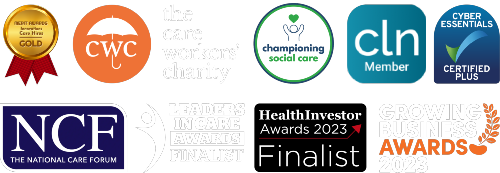Improve your CQC ratings
with these 5 tips
Improve your CQC ratings with these 5 tips
The Best Way to Boost Your CQC Rating
Achieving a high Care Quality Commission (CQC) rating is essential for elderly care providers across the country. Not only does it reflect the quality of care provided, but it also enhances your organisation’s reputation, instilling confidence in residents and their families. In this article, we’ll explore the best strategies to boost your CQC rating, focusing on workforce management and the impact it has on care quality.
1. Increase Workforce Density
Ensure Adequate Staffing Levels to Meet Care Demands
Maintaining sufficient staffing levels is a fundamental requirement of the CQC. According to CQC Regulation 18: Staffing, providers must have, “sufficient numbers of suitably qualified, competent, skilled, and experienced persons”, to meet the needs of those in their care.
How to Achieve This:
- Utilise Temporary Staffing: Employ agency staff to fill gaps during peak times, unexpected absences, or increased demand
- Flexible Scheduling: Implement staffing models that adapt to the changing needs of residents
- Monitor Staffing Ratios: Regularly assess staff-to-resident ratios to ensure compliance with CQC guidelines
Benefits:
- Enhanced resident safety and care quality
- Improved staff morale due to manageable workloads
- Compliance with CQC requirements, positively impacting your rating
2. Improve Staff Retention by Reducing Burnout
Support Permanent Staff to Enhance Retention and Care Quality
High staff turnover and burnout can negatively affect care quality and CQC ratings. Skills for Care emphasises that supporting staff wellbeing is crucial for retention and overall service quality.
How to Achieve This:
- Balanced Workloads: Use temporary staff to alleviate pressure on permanent employees
- Wellness Programs: Implement initiatives that promote physical and mental health well-being
- Professional Development: Offer training and career advancement opportunities
Benefits:
- Lower turnover rates and associated recruitment costs
- A more experienced and cohesive care team
- A positive workplace culture that enhances care delivery
3. Access Specialist Skills on Demand
Bring in Expertise to Meet Complex Care Needs
Residents may require specialised care that your current staff need to be trained to provide. The King’s Fund highlights the importance of access to specialist skills in delivering high-quality care.
How to Achieve This:
- Specialist Agency Staff: Hire temporary staff with the specific skills needed
- Training Partnerships: Collaborate with training organisations to upskill your team
- Resource Sharing: Network with other providers to share specialist resources
Benefits:
- Ability to offer a broader range of services
- Improved care outcomes for residents with complex needs
- Enhanced reputation as a comprehensive care provider
4. Support During Times of Inspection
Be Prepared and Confident When the CQC Visits
Inspections can be stressful, but being well-prepared can make a significant difference. Adequate staffing and well-documented procedures are crucial during these times.
How to Achieve This:
- Mock Inspections: Conduct internal audits to identify and address potential issues
- Staff Training: Ensure all staff are aware of CQC standards and expectations
- Temporary Staffing Boosts: Increase staff numbers during inspections to demonstrate compliance
Benefits:
- Smooth inspection process with fewer disruptions
- Demonstrated commitment to high standards
- Increased likelihood of a favourable CQC report
5. Seamless Care Delivery Even During Staff Absences
Maintain Consistency in Care Regardless of Circumstances
Unexpected absences can disrupt care delivery, affecting resident satisfaction and safety. Consistency is key to high-quality care.
How to Achieve This:
- On-Call Temporary Staff: Have a roster of agency staff ready to step in
- Cross-Training: Train staff in multiple roles to cover essential duties
- Robust Policies: Develop procedures for quickly addressing staffing shortfalls
Benefits:
- Uninterrupted care ensures resident needs are always met
- Reduces stress on other staff members who might otherwise have to cover extra duties
- Maintains compliance with staffing requirements at all times
Conclusion
Boosting your CQC rating involves a comprehensive multifaceted approach focused on workforce management, staff well-being, and consistent care delivery. By increasing workforce density, improving staff retention, accessing specialist skills, being prepared for inspections, and ensuring seamless care during absences, your organisation can enhance the quality of care provided and achieve higher CQC ratings.
Care Hires offers flexible staffing solutions tailored to the needs of elderly care providers. Our skilled professionals are ready to support your team, helping you maintain high standards and deliver exceptional care.
Ready to elevate your CQC rating? Contact Care Hires today to learn how we can help you achieve Outstanding.
Conclusion
Boosting your CQC rating involves a comprehensive multifaceted approach focused on workforce management, staff well-being, and consistent care delivery. By increasing workforce density, improving staff retention, accessing specialist skills, being prepared for inspections, and ensuring seamless care during absences, your organisation can enhance the quality of care provided and achieve higher CQC ratings.
Care Hires offers flexible staffing solutions tailored to the needs of elderly care providers. Our skilled professionals are ready to support your team, helping you maintain high standards and deliver exceptional care.
Ready to elevate your CQC rating? Contact Care Hires today to learn how we can help you achieve Outstanding.


